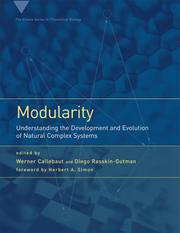| Listing 1 - 10 of 13 | << page >> |
Sort by
|
Book
ISBN: 9780919491328 Year: 2006 Publisher: Calgary, Alta University of Calgary Press
Abstract | Keywords | Export | Availability | Bookmark
 Loading...
Loading...Choose an application
- Reference Manager
- EndNote
- RefWorks (Direct export to RefWorks)
Affective and dynamic functions --- Emotions (Philosophy) --- Modularity (Psychology) --- Faculty psychology --- Modules (Psychology) --- Human information processing --- Philosophy
Book
ISBN: 1400835992 1282979116 9786612979118 9781400835997 9780691146744 0691146748 9781282979116 6612979119 Year: 2011 Publisher: Princeton, NJ
Abstract | Keywords | Export | Availability | Bookmark
 Loading...
Loading...Choose an application
- Reference Manager
- EndNote
- RefWorks (Direct export to RefWorks)
We're all hypocrites. Why? Hypocrisy is the natural state of the human mind. Robert Kurzban shows us that the key to understanding our behavioral inconsistencies lies in understanding the mind's design. The human mind consists of many specialized units designed by the process of evolution by natural selection. While these modules sometimes work together seamlessly, they don't always, resulting in impossibly contradictory beliefs, vacillations between patience and impulsiveness, violations of our supposed moral principles, and overinflated views of ourselves. This modular, evolutionary psychological view of the mind undermines deeply held intuitions about ourselves, as well as a range of scientific theories that require a "self" with consistent beliefs and preferences. Modularity suggests that there is no "I." Instead, each of us is a contentious "we"--a collection of discrete but interacting systems whose constant conflicts shape our interactions with one another and our experience of the world. In clear language, full of wit and rich in examples, Kurzban explains the roots and implications of our inconsistent minds, and why it is perfectly natural to believe that everyone else is a hypocrite.
Modularity (Psychology) --- Evolutionary psychology. --- Self-deception. --- Deception --- Defense mechanisms (Psychology) --- Self-perception --- Psychology --- Human evolution --- Faculty psychology --- Modules (Psychology) --- Human information processing

ISBN: 0199207070 9780199207077 9780199207084 0199207089 0191708909 9786611149017 0191525812 1281149012 1435624750 Year: 2006 Publisher: New York (N.Y.) Oxford university press
Abstract | Keywords | Export | Availability | Bookmark
 Loading...
Loading...Choose an application
- Reference Manager
- EndNote
- RefWorks (Direct export to RefWorks)
Peter Carruthers, a leading philosopher of mind, provides a comprehensive development and defense of one of the guiding assumptions of evolutionary psychology: that the human mind is composed of a large number of semi-independent modules. Written with unusual clarity and directness, and surveying an extensive range of research in cognitive science, it will be essential reading for anyone with an interest in the nature and organization of the mind.
Cognitive psychology --- Philosophical anthropology --- Theory of knowledge --- Mental Processes. --- Brain --- Psychology --- Modularity (Psychology) --- Brain. --- Psychologie --- Modularité (Psychologie) --- Cerveau --- physiology. --- Philosophy. --- Philosophie --- Modularity (Psychology). --- Modularité (Psychologie) --- Faculty psychology --- Modules (Psychology) --- Human information processing --- Cerebrum --- Mind --- Central nervous system --- Head --- Philosophy

ISBN: 0631233164 0631233156 Year: 2003 Publisher: Malden, Mass. Blackwell
Abstract | Keywords | Export | Availability | Bookmark
 Loading...
Loading...Choose an application
- Reference Manager
- EndNote
- RefWorks (Direct export to RefWorks)
Management --- Modularity (Psychology) --- Organization --- #SBIB:316.334.2A500 --- #SBIB:35H300 --- Faculty psychology --- Modules (Psychology) --- Human information processing --- Administration --- Industrial relations --- Organisation --- Organisatiesociologie: algemeen --- Organisatieleer: algemene werken --- Business policy --- Artificial intelligence. Robotics. Simulation. Graphics

ISBN: 0521789087 0521783313 0511611927 Year: 2000 Publisher: Cambridge Cambridge University press
Abstract | Keywords | Export | Availability | Bookmark
 Loading...
Loading...Choose an application
- Reference Manager
- EndNote
- RefWorks (Direct export to RefWorks)
How did our minds evolve? Can evolutionary considerations illuminate the question of the basic architecture of the human mind? These are two of the main questions addressed in Evolution and the Human Mind by a distinguished interdisciplinary team of philosophers, psychologists, anthropologists and archaeologists. The essays focus especially on issues to do with modularity of mind, the evolution and significance of natural language, and the evolution of our capacity for meta-cognition (thought about thought), together with its implications for consciousness. The editors have provided an introduction that lays out the background to the questions which the essays address, and a consolidated bibliography that will be a valuable reference resource for all those interested in this area. The volume will be of great interest to all researchers and students interested in the evolution and nature of the mind.
Genetic psychology --- Modularity (Psychology) --- Metacognition --- Psycholinguistics --- Evolutionary psychology --- Psychologie génétique --- Modularité (Psychologie) --- Métacognition --- Psycholinguistique --- Psychologie évolutionniste. --- Congresses --- Congresses. --- Congrès --- Psychologie génétique --- Modularité (Psychologie) --- Métacognition --- Psychologie évolutionniste. --- Congrès --- Cerveau --- Langage --- Ontogenèse --- Phylogenèse --- Arts and Humanities --- Philosophy --- Meta knowledge --- Metamemory --- Cognition --- Self-control --- Self-perception --- Faculty psychology --- Modules (Psychology) --- Human information processing --- Human genetics --- Psychology --- Genetic psychology. --- Psychologie génétique. --- Modularité (psychologie)

ISBN: 0195104145 1423741048 9781423741046 1602561133 9781602561137 9780195104141 9786610452569 6610452563 1280452560 0195355881 019772227X Year: 1997 Publisher: New York (N.Y.): Oxford university press
Abstract | Keywords | Export | Availability | Bookmark
 Loading...
Loading...Choose an application
- Reference Manager
- EndNote
- RefWorks (Direct export to RefWorks)
This collection of previously unpublished papers explores the implications of Chomsky's Minimalist framework for the modularity of grammar.
Psycholinguistics --- Grammar --- Generative grammar --- Grammar, Comparative and general --- Modularity (Psychology) --- Language, Psychology of --- Language and languages --- Psychology of language --- Speech --- Linguistics --- Psychology --- Thought and thinking --- Grammar, Generative --- Grammar, Transformational --- Grammar, Transformational generative --- Transformational generative grammar --- Transformational grammar --- Syntax --- Faculty psychology --- Modules (Psychology) --- Human information processing --- Psychological aspects --- Derivation --- Psycholinguistics. --- Generative grammar. --- Syntax. --- Philology --- Grammar, Comparative and general Syntax

ISBN: 0262560259 0262060841 0262315920 9780262315920 9780262060844 9780262560252 Year: 1983 Publisher: Cambridge, Mass. MIT
Abstract | Keywords | Export | Availability | Bookmark
 Loading...
Loading...Choose an application
- Reference Manager
- EndNote
- RefWorks (Direct export to RefWorks)
This study synthesizes current information from the various fields of cognitive science in support of a new and exciting theory of mind. Most psychologists study horizontal processes like memory and information flow; Fodor postulates a vertical and modular psychological organization underlying biologically coherent behaviors. This view of mental architecture is consistent with the historical tradition of faculty psychology while integrating a computational approach to mental processes. One of the most notable aspects of Fodor's work is that it articulates features not only of speculative cognitive architectures but also of current research in artificial intelligence. -- Publisher description.
130.3 --- 130.3 Metafysica van het geestesleven. Philosphy of mind. Artificial intelligence --- Metafysica van het geestesleven. Philosphy of mind. Artificial intelligence --- Cognition --- Modularity (Psychology) --- Faculty psychology --- Modules (Psychology) --- Cognition. --- Modularity (Psychology). --- Human information processing --- Psychology --- Cognitive psychology --- Modularité (Psychologie) --- COGNITIVE SCIENCES/General --- PHILOSOPHY/Philosophy of Mind/General

ISBN: 0631190171 Year: 1995 Publisher: Oxford Blackwell
Abstract | Keywords | Export | Availability | Bookmark
 Loading...
Loading...Choose an application
- Reference Manager
- EndNote
- RefWorks (Direct export to RefWorks)
Psycholinguistics --- Psycholinguïstiek --- Tweede-taalverwerving --- Vreemdetalenonderwijs --- didactiek --- Psycholinguïstiek. --- Tweede-taalverwerving. --- didactiek. --- Language and languages --- Modularity (Psychology) --- Savants (Savant syndrome) --- Second language acquisition --- Faculty psychology --- Modules (Psychology) --- Human information processing --- Second language learning --- Language acquisition --- Idiot savants --- Gifted persons --- People with mental disabilities --- Language, Psychology of --- Psychology of language --- Speech --- Linguistics --- Psychology --- Thought and thinking --- Foreign languages --- Languages --- Anthropology --- Communication --- Ethnology --- Information theory --- Meaning (Psychology) --- Philology --- Study and teaching&delete& --- Case studies --- Psychological aspects --- Study and teaching

ISBN: 0631161937 0631174559 Year: 1992 Volume: vol *4 Publisher: Oxford Blackwell
Abstract | Keywords | Export | Availability | Bookmark
 Loading...
Loading...Choose an application
- Reference Manager
- EndNote
- RefWorks (Direct export to RefWorks)
Cognitieve psychologie --- Cognitive psychology --- Genetic psychology --- Genetische psychologie --- Human intelligence --- Intellect --- Intelligence --- Mind --- Psychologie [Cognitieve ] --- Psychologie [Evolutionistische ] --- Psychologie [Genetische ] --- Psychologie cognitive --- Psychologie génétique --- Psychology [Cognitive ] --- Psychology [Genetic ] --- Verstand --- Intellect. --- Cognition. --- Modularity (Psychology) --- Individual differences. --- Cognition --- Modularité (Psychologie) --- Caractéristiques individuelles --- Individual differences --- Faculty psychology --- Modules (Psychology) --- Human information processing --- Ability --- Psychology --- Mental retardation --- Thought and thinking --- Differences, Individual --- Difference (Psychology) --- Modularité (Psychologie) --- Caractéristiques individuelles --- Psychologie génétique --- Genetic psychology. --- Cognitive psychology.

ISBN: 0262269694 1423729919 9780262269698 9781423729914 0262033267 9780262033268 Year: 2005 Publisher: Cambridge, Mass. MIT Press
Abstract | Keywords | Export | Availability | Bookmark
 Loading...
Loading...Choose an application
- Reference Manager
- EndNote
- RefWorks (Direct export to RefWorks)
Experts from diverse fields, including artificial life, cognitive science, economics, developmental and evolutionary biology, and the arts, discuss modularity.Modularity--the attempt to understand systems as integrations of partially independent and interacting units--is today a dominant theme in the life sciences, cognitive science, and computer science. The concept goes back at least implicitly to the Scientific (or Copernican) Revolution, and can be found behind later theories of phrenology, physiology, and genetics; moreover, art, engineering, and mathematics rely on modular design principles. This collection broadens the scientific discussion of modularity by bringing together experts from a variety of disciplines, including artificial life, cognitive science, economics, evolutionary computation, developmental and evolutionary biology, linguistics, mathematics, morphology, paleontology, physics, theoretical chemistry, philosophy, and the arts.The contributors debate and compare the uses of modularity, discussing the different disciplinary contexts of "modular thinking" in general (including hierarchical organization, near-decomposability, quasi-independence, and recursion) or of more specialized concepts (including character complex, gene family, encapsulation, and mosaic evolution); what modules are, why and how they develop and evolve, and the implication for the research agenda in the disciplines involved; and how to bring about useful cross-disciplinary knowledge transfer on the topic. The book includes a foreword by the late Herbert A. Simon addressing the role of near-decomposability in understanding complex systems.
Evolution (Biology) --- Natural selection. --- Chaotic behavior in systems. --- Modularity (Psychology) --- Biocomplexity. --- Natural selection --- Chaotic behavior in systems --- Biocomplexity --- Biology --- Health & Biological Sciences --- Evolution --- Biological complexity --- Complexity, Biological --- Chaos in systems --- Chaos theory --- Chaotic motion in systems --- Darwinism --- Selection, Natural --- Faculty psychology --- Modules (Psychology) --- Animal evolution --- Animals --- Biological evolution --- Evolutionary biology --- Evolutionary science --- Origin of species --- Biodiversity --- Differentiable dynamical systems --- Dynamics --- Nonlinear theories --- System theory --- Genetics --- Variation (Biology) --- Biological invasions --- Heredity --- Human information processing --- Biological fitness --- Homoplasy --- Phylogeny --- BIOMEDICAL SCIENCES/Evolution --- BIOMEDICAL SCIENCES/General
| Listing 1 - 10 of 13 | << page >> |
Sort by
|

 Search
Search Feedback
Feedback About UniCat
About UniCat  Help
Help News
News